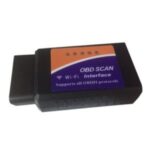The Mb Obd2 Scanner, short for Mercedes-Benz On-Board Diagnostics 2 scanner, is an essential tool for diagnosing and troubleshooting issues in Mercedes-Benz vehicles. With a wide variety of scanners available on the market, understanding your needs and the capabilities of different scanners is crucial for making an informed purchase. This guide will provide you with the necessary information to choose the right MB OBD2 scanner for your needs.
Understanding OBD2 Scanners and Their Importance for Mercedes-Benz
OBD2 scanners are electronic devices that connect to a vehicle’s OBD2 port, typically located under the dashboard on the driver’s side. These scanners communicate with the vehicle’s computer system, retrieving diagnostic trouble codes (DTCs) that indicate specific malfunctions. For Mercedes-Benz owners, an OBD2 scanner can be invaluable for:
- Identifying the root cause of warning lights: Check Engine Light, ABS light, Airbag light, and other warning indicators can be quickly diagnosed.
- Reading and clearing DTCs: The scanner allows you to understand the specific fault code and clear it after the issue is resolved.
- Monitoring live data: Real-time sensor data, such as engine speed, coolant temperature, and fuel pressure, can be viewed to assess vehicle performance.
- Performing specific tests: Some advanced scanners allow for component activation, adaptations, and other specialized functions specific to Mercedes-Benz vehicles.
Types of MB OBD2 Scanners
There are several types of OBD2 scanners available, each with varying capabilities and price points:
- Basic Code Readers: These entry-level scanners can read and clear basic DTCs. They are suitable for simple diagnostics and checking the cause of warning lights.
- Mid-Range Scanners: These scanners offer more advanced features, such as live data streaming, freeze frame data, and some bi-directional control. They are suitable for DIY enthusiasts and small workshops.
- Professional-Grade Scanners: These high-end scanners offer comprehensive diagnostic capabilities, including advanced coding, programming, and access to manufacturer-specific data. They are typically used by professional mechanics and specialized Mercedes-Benz repair shops. These scanners often include features like:
- Mercedes-Benz Specific Software: Tailored diagnostics and coding functions for various Mercedes-Benz models.
- SCN Coding: Performing online or offline coding and programming of control modules.
- Guided Diagnostics: Step-by-step instructions to help troubleshoot complex issues.
Factors to Consider When Choosing an MB OBD2 Scanner
When selecting an MB OBD2 scanner, consider the following factors:
- Your Skill Level: If you’re a beginner, a basic code reader might suffice. More experienced users may benefit from a mid-range or professional-grade scanner.
- Vehicle Year and Model: Ensure the scanner is compatible with your specific Mercedes-Benz model and year.
- Required Functionality: Determine the features you need, such as live data, bi-directional control, or SCN coding.
- Budget: OBD2 scanners range in price from affordable to very expensive. Set a budget before you start shopping.
- Software Updates: Regular software updates are essential to maintain compatibility with newer vehicle models and features. Ensure the scanner you choose offers convenient update options.
Conclusion: Making an Informed Decision
Choosing the right MB OBD2 scanner can empower you to diagnose and maintain your Mercedes-Benz effectively. By understanding your needs, researching different scanner types, and considering the factors outlined above, you can invest in a tool that will provide valuable insights into your vehicle’s health and performance. Careful consideration will lead you to the perfect scanner to meet your diagnostic needs and keep your Mercedes-Benz running smoothly.
